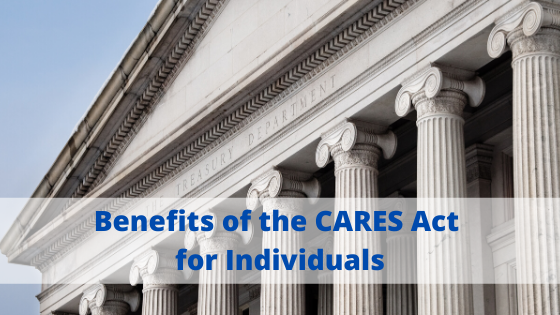Benefits of the CARES Act for Individuals
Submitted by Neville Associates on April 16th, 2020
The Coronavirus Aid, Relief, and Economic Security act – the CARES Act – is the largest economic bill in U.S. history and was designed to “provide emergency assistance and health care response for individuals, families, and businesses affected by the 2020 coronavirus pandemic.”
Spanning close to 900 pages, the comprehensive aid package covers a lot, including direct payments to Americans, expanded unemployment insurance , changes to retirement rules and billions of dollars in aid to businesses.
The CARES Act builds upon earlier versions of federal government support and is the third such bill, coming shortly after the “Coronavirus Preparedness and Response Supplemental Appropriations Act” and the “Families First Coronavirus Response Act” were approved.
Here are a few highlights that might be of interest to individuals:
Rebate for Individuals
The bill would provide a $1,200 refundable tax credit for individuals ($2,400/joint). Additionally, taxpayers with children will receive a flat $500 for each child. The rebates would not be counted as taxable income.
The rebate does phase out as follows:
- $75,000 for singles and $112,500 for heads of household
- $150,000 for joint taxpayers at 5 percent per dollar of qualified income, or $50 per $1,000 earned
- Entirely at $99,000 for single taxpayers with no children and $198,000 for joint taxpayers with no children
Unemployment Expansion
Unemployment insurance assistance now includes an additional $600 per week payment to each recipient for up to four months plus extend benefits to self-employed workers, independent contractors, and those with limited work history. The government will provide temporary full funding of the first week of regular unemployment for states with no waiting period and extend benefits for an additional 13 weeks through December 31, 2020.
Waiver of 10% Withdrawal Penalty
The 10% penalty for early withdrawals from IRAs and retirement accounts is being waived for 2020, subject to a maximum allowable withdrawal of $100,000.
Withdrawal amounts are taxable over three years, but taxpayers can recontribute the withdrawn funds into their retirement accounts for three years without affecting retirement account caps.
Requited Minimum Distributions
For 2020, individuals expected to take Required Minimum Distributions will not be required to withdrawal that amount from their IRA or retirement plan.
Coronavirus-Related Distributions
The CARES Act allows for “Coronavirus-related Distributions” which allow participants in IRAs and retirement plans the ability to take a qualifying withdrawal and pay those funds back without tax or interest over a 3-year period. The withdrawal is subject to a $100,000 limit.
There are qualifications for Coronavirus-Related Distributions, however, including:
- Personal, spouse or dependent diagnosis with COVID-19
- Quarantined, furloughed, laid off, or work hours reduced because of COVID-19
- Unable to work due to lack of childcare due to COVID-19
- Own a business that is closed or shortened hours due to COVID-19
- Other factors later specified by the IRS
Retirement Loans
For those unable to meet the Coronavirus-Related Distributions criteria, withdrawals from retirement plans in the form of a loan exists.
Generally speaking, those loans need to be repaid back over 5 years and cannot exceed $50,000 or half the vested account value, whichever is less. Now, however, the amount is doubled so that one can take a loan up to $100,000 or half of the vested account value, whichever is less. The loan still needs to be repaid, but payments can be deferred up to 1 year after the loan is taken.
Your Financial Professional
As with all federal government programs, there are rules, deadlines and qualifications that can be difficult to decipher. The fact is that while this is by far the largest economic bill in America’s history, it is near impossible for any bill to take into account every unique situation.
So, before you go down a path that might not be in your best interest long-term, make sure you talk to your financial professional.
This is especially important as the CARES Act is bill number three. And Washington has been talking about bill number four, which will undoubtedly bring more economic relief and changes.
Important Disclosures
All information is believed to be from reliable sources; however LPL Financial makes no representation as to its completeness or accuracy.
This information is not intended to be a substitute for specific individualized tax or legal advice. We suggest that you discuss your specific situation with a qualified tax or legal advisor.
This article was prepared by RSW Publishing.
LPL Tracking 01-979772

